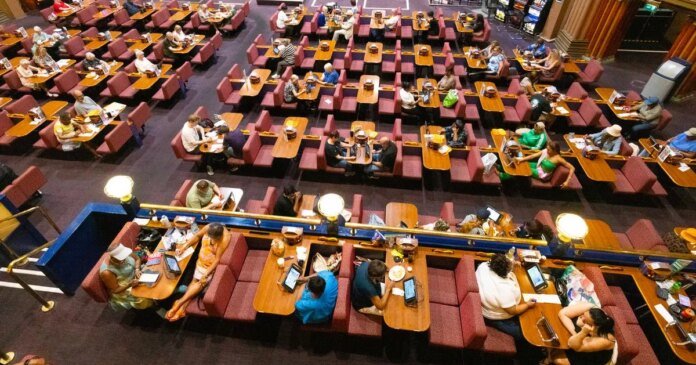Bingo halls are being praised for their role in addressing a widespread issue of loneliness, as stated by the leader of the largest bingo chain in the UK.
Dominic Mansour, the head of Buzz Bingo, formerly known as Gala, emphasized that bingo is more than just a game of numbers; it fosters a sense of community, connection, and offers a safe environment for social interaction.
However, there has been a noticeable decrease in the number of bingo establishments nationwide. Buzz Bingo, which previously operated 137 sites, now has 79 locations due to the impact of the Covid-19 pandemic, resulting in reduced footfall.
The overall bingo industry has seen a decline from 335 venues before the pandemic to 247 presently, a sharp drop from around 635 establishments when the smoking ban was introduced in 2007. This trend aligns with the diminishing number of pubs, which also serve as important social hubs.
Mansour highlighted that their venues are integral to the community but acknowledged the challenges faced by the sector in recent years. A survey conducted by the company revealed that nearly half of players experienced loneliness before attending bingo sessions, with the majority leaving feeling more connected and less isolated.
Recent research indicates that nearly 26 million UK adults report feelings of loneliness occasionally, often, or consistently, with around 3.8 million individuals experiencing chronic loneliness. Mansour emphasized the significant role bingo plays in combating isolation and promoting well-being amidst this loneliness epidemic.
Testimonials from regular bingo players like David Chatfield, Angela Freebury, and Brenda Whitby underscore the importance of these venues in providing social interaction and a sense of belonging for individuals of all ages.
While appealing primarily to older individuals and women, Buzz Bingo is striving to attract a younger audience. Mansour acknowledged the challenges faced by the company, with many venues in need of refurbishment and significant fixed costs impacting operations.
The company has allocated £25 million for investments, with refurbished clubs experiencing increased patronage. Miles Baron, CEO of The Bingo Association, emphasized that besides the opportunity to win money, the social aspect of bingo remains a key driver for players.
As the industry faces economic challenges, there is speculation about potential tax hikes on gambling operators in the upcoming Budget. Mansour expressed concerns about increased taxation impacting their ability to invest and sustain operations, highlighting the potential consequences of such a move on the industry.
In conclusion, the crucial role of bingo halls in fostering social connections and addressing loneliness is evident, making them vital community spaces that contribute positively to individuals’ well-being and quality of life.
